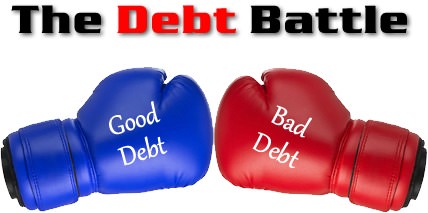Many of us pay a lot of attention to asset-oriented investments and receive a great deal of advice and information pertaining to asset products. Typically, we focus much less attention on the decisions related to our debts. Debt is not always a bad thing and it doesn’t always make sense to pay debt off. There are times when we are presented with very low interest loans, even as low as zero percent. For example, auto dealers frequently offer low to no interest loans as incentives to purchase a new car.
 So, what is debt? Debt is not any form of borrowing. Debt is a financial obligation to pay for something that you have no collateral or no possible way to pay for except with future income you’ve yet to earn. If something happens to your job or your ability to work, you’re in trouble. However, if you have enough money in an account that you could use to eliminate the debt with the stroke of a pen, are you really in debt, or have you simply determined that it is more financially beneficial to use other people’s money than it is to use your own? The question isn’t should I finance, because you choose to finance regardless of how you choose to pay for a purchase. The question is “what is the most efficient way to finance my purchase without having to give up liquidity, use, and control of my money?”
So, what is debt? Debt is not any form of borrowing. Debt is a financial obligation to pay for something that you have no collateral or no possible way to pay for except with future income you’ve yet to earn. If something happens to your job or your ability to work, you’re in trouble. However, if you have enough money in an account that you could use to eliminate the debt with the stroke of a pen, are you really in debt, or have you simply determined that it is more financially beneficial to use other people’s money than it is to use your own? The question isn’t should I finance, because you choose to finance regardless of how you choose to pay for a purchase. The question is “what is the most efficient way to finance my purchase without having to give up liquidity, use, and control of my money?”
There are typically two types of debt available to us: Personal Debt and Investment Debt.
Personal debt is money borrowed to purchase an asset that will most likely depreciate in value. It is the most costly type of debt a person can have because the asset will eventually depreciate to $0. For example, if you borrow $30,000 at 5.00% for 5 years to buy a new car, what will you actually pay? Your car payment of $566.14 over 5 years will total $33,968 ($566.14 x 60), which is the $30,000 you borrowed plus $3,968 in interest you pay to the lender for the use of their money. At the end of 5 years the car may be worth $10,000. Your investment of $33,968, less the car’s 5-year value of $10,000, would result in a net cost of $23,968.
Other types of personal debt include most credit card purchases, personal loans, and other unsecured debt used to invest in an asset that will depreciate in value. Because this debt is typically for something that will decrease in value, it is typically unsecured debt, so it will also require a higher interest rate.
Investment debt is money borrowed to buy something that will typically appreciate in value. Although we refer to this as a form of debt, it often increases a person’s net wealth. For example, consider the purchase of a house for $375,000 with a 30-year mortgage of $300,000 at a 5.00% interest rate. If the house itself were to appreciate at 4.00% per year, it would be worth $1,216,274 in 30 years. The interest you pay during this 30-year period would add up to $279,766. Thus, your payment for the house ($375,000) plus interest ($279,766) would total $654,766 ($375,000 + $279,766). However, you would have a house worth $1,216,274. Thus, you would gain $561,508 ($1,216,274 – $654,66) in wealth related to this debt, not adjusting for inflation.
Those who operate under false definitions of debt see debt as a necessary evil to use for big purchases like houses and cars. When you can grasp what debt is and recognize the difference between personal debt and investment debt, you can get out and stay out of debt and use financing productively to maximize your wealth and prosperity.
 Many people believe that a large part of financial security comes from having all of one’s debt paid in full. Paying something off may or may not be a good strategy, but what’s important to recognize is that this distinction lies in the realm of strategy, not principle. Principles rarely change; strategies change often to suit existing circumstances. Contact us to discuss strategies that can grow your wealth.
Many people believe that a large part of financial security comes from having all of one’s debt paid in full. Paying something off may or may not be a good strategy, but what’s important to recognize is that this distinction lies in the realm of strategy, not principle. Principles rarely change; strategies change often to suit existing circumstances. Contact us to discuss strategies that can grow your wealth.
If you’re interested in learning more about what to consider when determining which form of financing is best for a major capital purchase download our FREE report entitled “Is Paying Cash Detrimental to Your Financial Health?” We also encourage you to contact us to schedule a time to talk about your specific circumstances.
Leave a Comment